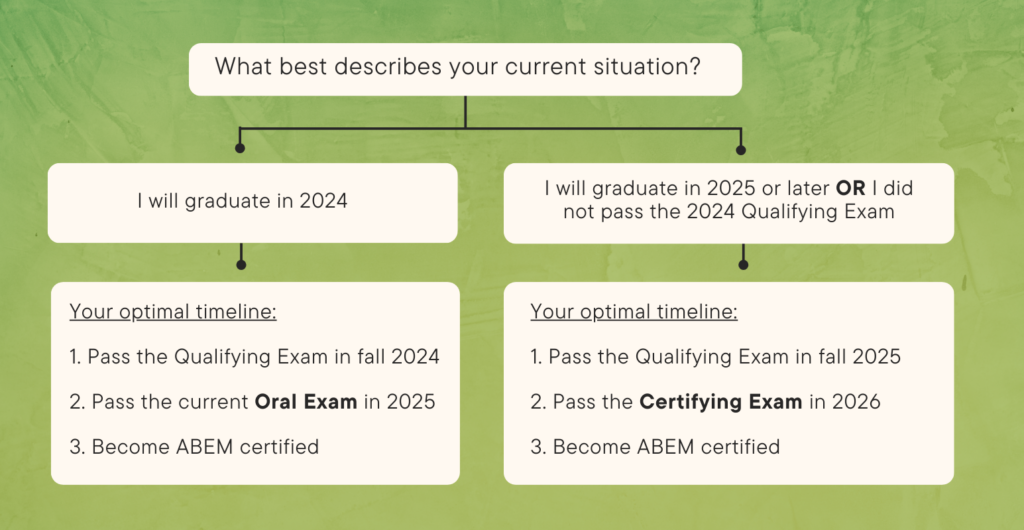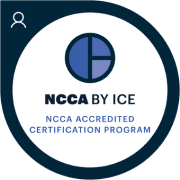- Get Certified
- Certification Process
- Subspecialties and FPDs
- Focused Practice Designations
- Anesthesiology Critical Care Medicine
- Emergency Medical Services (EMS)
- Health Care Administration, Leadership, & Management (HALM)
- Hospice and Palliative Medicine
- Internal Medicine – Critical Care Medicine
- Medical Toxicology
- Neurocritical Care
- Pain Medicine
- Pediatric Emergency Medicine
- Sports Medicine
- Undersea and Hyperbaric Medicine
Oral Exam


Winter 2024 Administration
Dates & Fees | LATE Dates & Fees | |
Exam Dates | December 3-6, 2024 |
|
Registration Period | February 15 – November 4, 2024 | November 5-11 |
Registration Deadline | November 4, 2024 at 11:59 p.m., ET | November 11, 2024 at 11:59 p.m., ET |
Fee* | $1,255 | $1,565 |
2025 Administration Dates
Spring
April 29-May 2, 2025
Fall
October 7-10, 2025
Winter
December 9-12, 2025
More information will be posted as it becomes available.
Will I take the Oral Exam or Certifying Exam?

Oral Exam Overview
The third step for ABEM certification is the Oral Certification Examination. The Oral Exam is a standardized test of Emergency Medicine knowledge, using scenarios based on actual clinical cases.
The Oral Exam measures skills that cannot be tested on a multiple choice exam. It’s important that ABEM-certified physicians can clearly communicate with patients and their families, organize information about patients, and make good choices for patient management.
Exam Build
(5) Single-patient Cases
Fifteen minutes are allotted for each of five, single-patient cases. Stimuli and all case information will be delivered by the examiner sharing the screen. Introductory information may include such materials as an admitting form, a transfer sheet, EMS report, or X-rays.
One of these cases could serve as a field test. You will not be told which case is being researched for effectiveness of its assessment; you should treat each case as if it will be scored.
(2) Structured Interview Cases
The two structured interviews are designed to assess the candidate’s thought processes. It is more like a discussion as to your approach of working up a patient in the emergency department. The examiner will ask you scripted questions to assess why you take certain actions, how you develop a differential and final diagnosis, and how you transition the care of the patient.
Case Content
- 1.0 Signs, Symptoms, and Presentations
- 2.0 Abdominal & Gastrointestinal Disorders
- 3.0 Cardiovascular Disorders
- 4.0 Cutaneous Disorders
- 5.0 Endocrine, Metabolic, & Nutritional Disorders
- 6.0 Environmental Disorders
- 7.0 Head, Ear, Eye, Nose, & Throat Disorders
- 8.0 Hematologic Disorders
- 9.0 Immune System Disorders
- 10.0 Systemic Infectious Disorders
- 11.0 Musculoskeletal Disorders (Non-traumatic)
- 12.0 Nervous System Disorders
- 13.0 Obstetrics and Gynecology
- 14.0 Psycho behavioral Disorders
- 15.0 Renal and Urogenital Disorders
- 16.0 Thoracic-Respiratory Disorders
- 17.0 Toxicologic Disorders
- 18.0 Traumatic Disorders
- 19.0 Procedures & Skills
- 20.0 Other Components
Blueprint Specifications
- consists of 7 cases: 5 standardized single-patient encounters and 2 structured interviews
- case content and patient encounters from any area of the EM Model, although candidates should expect to see cases with the following high frequency underlying conditions:
- Cardiovascular Disorders
- Traumatic Disorders
- Thoracic-Respiratory Disorders
- Systemic Infectious Disorders
- will generally include at least one pediatric and one geriatric case
- will include over 50% of cases with critical acuity
- will assess skills and abilities in the following areas derived from the ABEM Knowledge, Skills, and Abilities (KSAs):
| Skill or Ability | Approximate Percentage by Skills |
| Communication | 10-15 |
| Data Gathering | 10-15 |
| Synthesis | 20-30 |
| Management | 15-25 |
| Disposition | 15-25 |
| Judgement or Other | 10-15 |



